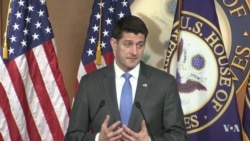House of Representatives Speaker Paul Ryan will not run for re-election this November, raising questions about the Republicans' ability to maintain control of the House during midterm elections.
During a press conference on Wednesday, Ryan announced he will retire after this Congress ends in January because he wants to spend more time with his family.
“I have given this job everything I have, and I have no regrets whatsoever for having accepted this responsibility,” Ryan told reporters. “But the truth is, it’s easy for it to take over everything in your life.”
After 20 years in Congress, Ryan noted, he wants to spend more time with his wife and three teenage children.
“If I’m here one more term, my kids will only have ever known me as a weekend dad. I just can’t let that happen,” he explained.
His departure likely will lead to a battle to replace him as House Speaker. Some key players reportedly are House majority leader, Kevin McCarthy of California, and the House majority whip, Steve Scalise of Louisiana.
Ryan dismissed concerns that his retirement may affect Republican efforts to keep its majority in the House.
“I really do not believe whether I stay or go in 2019 is going to affect a person’s individual race for Congress,” he said.
President Donald Trump, with whom Ryan has had a tense relationship at times, praised the Ryan on Twitter.
“Speaker Paul Ryan is a truly good man and while he will not be seeking re-election, he will leave a legacy of achievement that nobody can question. We are with you Paul!” tweeted the president on Wednesday.
Ryan touted accomplishments under his leadership, including passage of sweeping tax reform legislation in December, legislation he said will help rebuild the nation’s military.
The speaker vowed to continue to work on entitlement reform during the remainder of his time in office.
Ryan expressed gratitude for having served as leader of the House Republican Conference since 2015, a post he reluctantly took after his predecessor, John Boehner, departed under pressure from a conservatives.
Tensions within his own party continued under Ryan’s tenure, with Republicans unable to repeal and replace the Obama-era Affordable Care Act, a key promise by President Trump during his presidential campaign.
Despite Ryan's sometimes uneasy relationship with Trump, the speaker and White House worked together to push the conservative agenda.
Democratic Leader Nancy Pelosi issued a statement commending Ryan for “his steadfast commitment to our country” and expressed hope both parties will “work constructively” during his remaining time in Congress.






